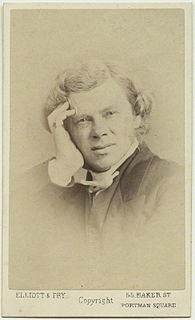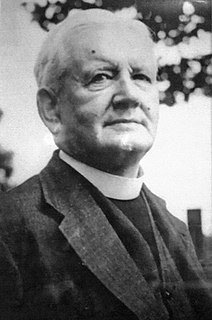Related Research Articles

John Saul Howson, British divine, was born at Giggleswick-on-Craven, Yorkshire.

Albert Neilson Hornby, nicknamed Monkey Hornby was one of the best-known sportsmen in England during the nineteenth century excelling in both rugby and cricket. He was the first of only two men to captain the country at both rugby and cricket but is also remembered as the England cricket captain whose side lost the Test match which gave rise to the Ashes, at home against the Australians in 1882. Additionally, he played football for Blackburn Rovers.

Richard Phipps Hornby was a British Conservative politician and businessman. He was Member of Parliament for Tonbridge for over 17½ years, from June 1956 to February 1974, holding a junior ministerial position for a year in the mid-1960s. He worked for the J. Walter Thompson advertising agency before, during, and after his career in Parliament, and was Chairman of the Halifax Building Society from 1983 to 1990.

James Charles McGuigan was a Canadian prelate of the Catholic Church. He was the longest-serving Archbishop of Toronto, serving for almost 37 years from 1934 to 1971. He became the first English-speaking cardinal from Canada in 1946.

William Thomas Havard was a Welsh clergyman and rugby union international player. He served as a military chaplain during the First World War, and later as Bishop of St Asaph and then Bishop of St David's in the Church in Wales.

Inskip-with-Sowerby is a civil parish in the Borough of Wyre, in Lancashire, England. A part of the Fylde, the parish includes the village of Inskip and the hamlets Crossmoor to the west and Sowerby to the east. Also Inskip Moss Side lies about a mile north-west of the village at grid reference SD452391. In 2011 it had a population of 840.

Sir Edwyn Hoskyns, 12th Baronet was a British Anglican bishop who served in the Church of England in the early 20th century.
William Alonzo Parker was a former Anglican Bishop of Shrewsbury.

Piers Holt Wilson was an Anglican bishop in the mid part of the 20th century.

Charles Frederick D'Arcy was a Church of Ireland bishop. He was the Bishop of Clogher from 1903 to 1907 when he was translated to become Bishop of Ossory, Ferns and Leighlin before then becoming the Bishop of Down, Connor and Dromore. He was then briefly the Archbishop of Dublin and finally, from 1920 until his death, Archbishop of Armagh. He was also a theologian, author and botanist.
Alfred Carey Wollaston Rose was the sixth Bishop of Dover, England, in the modern era, from 1935 to 1956.
John Charles Halland How OGS was an Anglican bishop.
Harry William Blackburne DSO, MC was an Anglican clergyman, Dean of Bristol from 1934 to 1951.

Lauchlan MacLean Watt FRSE was the minister of Glasgow Cathedral from 1923–34, and the Moderator of the General Assembly of the Church of Scotland in 1933. He was a published poet and author, and a literary critic.
Spencer Cecil Carpenter was an Anglican priest and author. He was the Dean of Exeter in the Church of England from 1935 to 1950.
Richard Henry Malden, BD,, Dean of Wells, was a prominent Anglican churchman, editor, classical and Biblical scholar, and a writer of ghost stories.
Phipps John Hornby was Archdeacon of Lancaster from 1909 to his death.

The Church of St Thomas, Thurstonland, West Yorkshire, England, is an Anglican church. It is an Arts and Crafts building in Gothic Revival style, designed by James Mallinson and William Swinden Barber, and completed in 1870. The building was funded by William Legge, 5th Earl of Dartmouth, and it was consecrated by Robert Bickersteth, Bishop of Ripon. The total height of the tower and spire is 109 feet (33 m), and the nave contains an arch-braced hammerbeam roof.
Sidney Nowell Rostron was a Church of England priest, theologian, and academic. He was the first Principal of St John's College, Durham, serving from 1909 to 1911. He then returned to parish ministry and was vicar of a number of parishes. During World War I, he served with the Army Chaplains' Department as a military chaplain. From 1928 to 1942, he was additionally Whitehead Professor of Pastoralia at the London College of Divinity.

Angelo Raine was a British clergyman, antiquarian, and archivist.
References
- ↑ London Gazette,2.7.1919